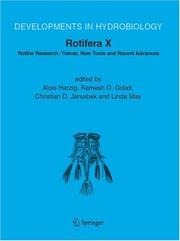| Listing 1 - 2 of 2 |
Sort by
|

ISBN: 1280462469 9786610462469 1402044089 1402034938 9048168856 Year: 2005 Publisher: Dordrecht Springer
Abstract | Keywords | Export | Availability | Bookmark
 Loading...
Loading...Choose an application
- Reference Manager
- EndNote
- RefWorks (Direct export to RefWorks)
This volume reflects the latest developments in the research of a global community of rotifer researchers, who came together at Illmitz, Austria in 2003. Contributions are manifold and span fields from phylogeny and evolution of the phylum Rotifera to practical aspects of aquaculture and ecotoxicology. Major issues include phylogeny and evolution, genetics and molecular ecology, new aspects of rotifer anatomy through the application of confocal laser-scanning microscopy, anhydrobiosis, long-term studies in lakes and rivers, population dynamics and community ecology, trophic relationships between copepods and rotifers, alongside biodiversity studies based on classical taxonomic concepts and molecular approaches. Although primarily focussed on one taxonomic group, the scientific outcome of this meeting is of relevance to the study of other aquatic microinvertebrates as well.
Rotifera --- Worms --- Vermes --- Vermiform animals --- Bilateria --- Invertebrates --- Animalcules, Wheel --- Rotatoria --- Rotifers --- Syndermata --- Trochelminthes --- Wheel animalcules --- Wheel animals --- Aquatic invertebrates --- Protozoans --- Hydrobiology --- Invertebrates. --- Aquatic biology. --- Microscopy. --- Freshwater & Marine Ecology. --- Biological Microscopy. --- Analysis, Microscopic --- Light microscopy --- Micrographic analysis --- Microscope and microscopy --- Microscopic analysis --- Optical microscopy --- Optics --- Water biology --- Aquatic sciences --- Biology --- Invertebrata --- Animals --- Aquatic ecology . --- Aquatic biology --- Ecology
Book
ISBN: 9811056358 9811056331 Year: 2017 Publisher: Singapore : Springer Singapore : Imprint: Springer,
Abstract | Keywords | Export | Availability | Bookmark
 Loading...
Loading...Choose an application
- Reference Manager
- EndNote
- RefWorks (Direct export to RefWorks)
This book highlights the latest advances in rotifer studies in various fields including aquaculture, ecology, gerontology and ecotoxicology. The genus Brachionus are an indispensable type of zooplankton, having served as an initial live food for marine larval rearing since the 1960s. Their mass culture techniques have been intensively studied, and some essential achievements have been made – regarding high density culture, employment of valuable dietary algae, automated culture systems, and effective production of resting eggs. These have in turn supported stable and efficient aquatic seedling production for numerous important marine fish species including flounder, sea bream, and bluefin tuna. Further, this group is considered to be a suitable model for studying various aspects in ecology. A series of aquaculture and basic science studies have significantly advanced our understanding of the life history evolution. The studies in these two fields are closely linked, and provide readers with comprehensive information on how rotifers are now being employed in biological investigations.
Life sciences. --- Ecology. --- Zoology. --- Wildlife. --- Fish. --- Marine sciences. --- Freshwater. --- Life Sciences. --- Fish & Wildlife Biology & Management. --- Marine & Freshwater Sciences. --- Rotifera. --- Animalcules, Wheel --- Rotatoria --- Rotifers --- Syndermata --- Trochelminthes --- Wheel animalcules --- Wheel animals --- Aquatic invertebrates --- Bilateria --- Wildlife management. --- Marine Sciences. --- Biology --- Natural history --- Animals --- Balance of nature --- Bionomics --- Ecological processes --- Ecological science --- Ecological sciences --- Environment --- Environmental biology --- Oecology --- Environmental sciences --- Population biology --- Animal populations --- Game management --- Management, Game --- Management, Wildlife --- Plant populations --- Wildlife resources --- Natural resources --- Wildlife conservation --- Ocean sciences --- Aquatic sciences --- Ecology --- Management --- Ecology . --- Fish --- Pisces --- Aquatic animals --- Vertebrates --- Fisheries --- Fishing --- Ichthyology --- Fresh waters --- Freshwater --- Freshwaters --- Inland water --- Inland waters --- Water
| Listing 1 - 2 of 2 |
Sort by
|

 Search
Search Feedback
Feedback About UniCat
About UniCat  Help
Help News
News